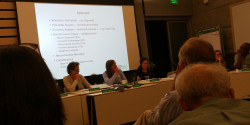 The Santa Cruz Sentinel reports that struggling public radio station KUSP has laid off its general manager Terry Green. He ran the operation for a dozen years, the last eight or so dedicated to making the signal more competitive with neighboring NPR outlet KAZU. But now KUSP is “on the brink of bankruptcy,” according to the Sentinel, with loans and payments due reaching over $700k, much of it owed to NPR. Green’s last day as GM of the station was Wednesday.
The Santa Cruz Sentinel reports that struggling public radio station KUSP has laid off its general manager Terry Green. He ran the operation for a dozen years, the last eight or so dedicated to making the signal more competitive with neighboring NPR outlet KAZU. But now KUSP is “on the brink of bankruptcy,” according to the Sentinel, with loans and payments due reaching over $700k, much of it owed to NPR. Green’s last day as GM of the station was Wednesday.
Since earlier this year, KUSP has been trying to reconceptualize itself. Its board almost decided to sell the station, then didn’t, then proposed a series of possible new tree named formats which it eventually whittled down to three and then to one, created by a KUSP Internal Working Group and presented at a public board meeting in mid-July. (You can view the forest of resultant Powerpoint slides here; thank you KUSP Forward group).
I attended that gathering, which was presided over by Green as well as several board members who have since resigned. The meeting room at the Aptos Community Foundation building was packed with attendants. Without quoting anyone directly, here are my impressions:
First, members of the audience were extremely skeptical about the final proposal. One pointedly asked Green and others how it substantially differed from KUSP’s current NPR-laden lineup, perceived as expensive and redundant given KAZU’s format. Sitting close to these attendants, I could tell that they remained unconvinced by the responses they received.
Second, various people in the audience obviously wanted KUSP to go back to some kind of music-centric format. They argued that a music-oriented station would be more affordable and enjoyable. Speaking from the floor, one individual was indignantly skeptical about claims that most public radio listeners want news and public affairs programming rather than music. I sympathized with this person’s love of music; I mostly listen to radio for music myself; but most studies I’ve seen suggest that a preponderance of public radio subscribers want news and talk; many feel like they can curate music on their own.
Third, the NPR debt may be very intractable. KUSP owes about $435k in back fees for NPR programming. A few people at the front table (board members I think) confided that they thought they had been making progress with NPR about renegotiating this debt, but then NPR became increasingly conscious of the public example its leniency might have with other debtor stations and became more rigid about the issue.
Fourth, it was clear that some board members felt like they had been dealt out of the conversation. I am a bit of a cynic about these things. I’ve been to a lot of public/community radio board meetings and expect to hear the following statements at every one of them: “I don’t see a lot of people like me in this room.” “We need to reach out to the community.” “We need to get back to our roots.” But as jaundiced as I am, I was struck by comments suggesting, at least to me, that the internal conversations of the board were dominated by a few individuals. They in turn spoke defensively at the meeting whenever this possibility was raised.
Fifth, KUSP has no sense of identity. To keep the forestry theme going, it has become so subsumed in putting out immediate fires that it has lost any clear, concise definition of itself. People on the board more or less said this at the end of the meeting.
The event concluded without adopting any particular plan and the summer delayed along until now. My guess is that, money issues aside, this latest shakeup may have been precipitated in part by soliciting so much community input and then letting matters drift. The Sentinel article quotes KUSP Board President Kelly O’Brien suggesting that the station may indeed place more of an emphasis on music. On the other hand she also warns that the signal still could wind up being sold if the operation’s finances aren’t repaired soon. I continue to hope that the station will not adopt an ersatz “something for everyone model” that is intended to make all participants happy and achieves the opposite result.



